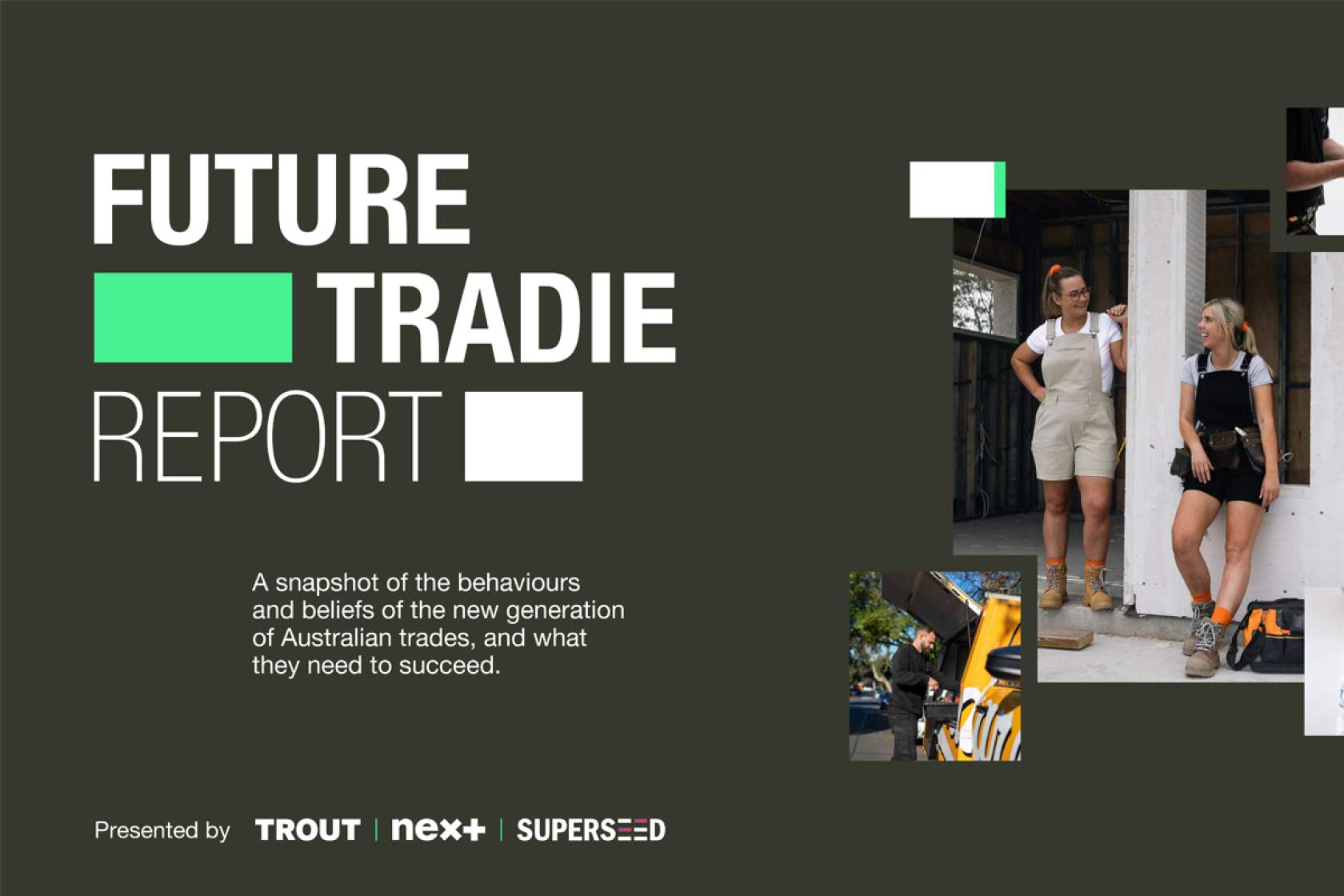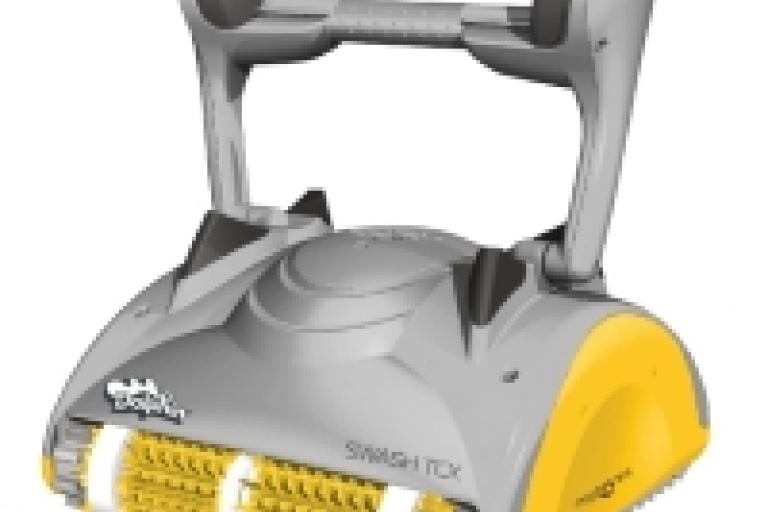Future tradie’s report looks towards the next five years in construction

A new foresight report is shining light on the ambitions and priorities of Australian tradies, in a snapshot of the behaviours and beliefs of the new generation, looking towards a five-year horizon.
The Future Tradie Report 2024 was created by Trout, Next and Superseed. Together the three business deliver creativity, research and ventures for trades, construction and home renovation businesses as part of The Reece Group.
Data to inform the report comes from 16 small business leaders and industry experts, with 1071 survey respondents from trades professionals including plumbers, builders, carpenters, bricklayers, electricians, painters, plasterers and HVAC installers. The methodology involves 60 minute interviews with 13 emerging residential trades leaders, and 60 minute interviews with three trades business experts.
Key themes include professional values, recruitment, team culture, sustainability, business skills, generational clashes, new customer service standards, and diversity in the trades.
According to the Australian Bureau of Statistics, by 2033, 75 per cent of the trade workforce will be made up millennials and Gen Z, a cohort who have different expectations and motivators than their predecessors.
With government commitments to housing quotas and a growing population, the pressure on residential trades to build and maintain homes has never been greater. However, the collapse of construction companies has risen by 28 per cent year-on-year, according to CreditorWatch, and more apprentices are dropping out than are qualifying each quarter.
The evidence suggests businesses who support tradespeople by helping them navigate doing business, introducing sustainable and affordable product solutions, and supporting healthy team cultures will win.
Emily Pockley, general manager of Trout, says they work with clients in trades and construction every day, using creative thinking to grow their businesses.
“We chose to develop the Future Tradie Report at a time when the industry is at a unique crossroads, as a tool to inform future strategies and help tradies succeed. Our data shows that 49 per cent of surveyed tradies under 35 years old want to start their own business in the next five years.
“That’s a huge opportunity for brands and organisations servicing this space,” she says.
Clients can get a head-start on future-proofing their approach by considering this audience as part of their brand and marketing mix.”
Jeremy Crow, group innovation director at Reece, says that Trout’s insights into the trades have real strategic and creative nous for building brands.
“The Future Tradie Report gives clients like Reece access to fresh thinking, so we can stay on top of our game.”
Themes and mindsets
The research is presented as both an interactive web portal, letting visitors explore video, audio, imagery and data to bring brands and organisations closer to tradespeople’s priorities and sentiment.
In the report, five emerging themes and four future mindsets are identified. The themes are:
Limitless learning
Business coaches, specialist partners, social networks and AI help tradies learn business skills and niche techniques that aren’t taught in TAFEs or on-site: 38 per cent of surveyed tradies under 25 years old got into their trade to build a business.
Values reboot
Renewed commitment to integrity, professionalism, resilience and self-development to mend the trust eroded by unprofessional approaches: 24 per cent of surveyed tradies expect future tradies to prioritise skills, knowledge and continuous learning, 18 per cent expect work ethic, professionalism and integrity.
Sustainable building
Prioritisation of sustainable and long-lasting solutions, so long as they are affordable: 64 per cent of surveyed tradies under 35 year olds are either using sustainable working practices, or trying to.
Tradie hospitality
Securing more word-of-mouth maintenance jobs and high value boutique building contracts through elevated levels of client service: 41 per cent of surveyed tradies see service excellence as their company’s competitive advantage.
Magnetic culture
Labour shortages and changing expectations of work mean finding and keeping talent is a top priority. Welcoming, vulnerable company culture is a drawcard above money: 25 per cent of surveyed tradies under 45 years old believe having a strong team culture makes their company competitive (compared with only 7 per cent over 45 years old).
Mindsets include the business optimiser, the culture leader, the service steward and the niche specialist, indicating a shift away from legacy attitudes of tall poppy syndrome, manual business processes, and a “grin and bear it” approach to pressures at work.
Business optimiser
Keeps close to business goals and metrics, prioritises systems and processes, and borrows from other sectors to drive efficiency.
Service steward
Prioritises customer service, over-indexes on transparency, communications and professionalism. For example, polite interactions and branded uniforms.
Niche specialist
Focuses on a niche such as sustainability, and leads the way using new techniques and systems in their field.
Culture leader
Invests in driving positive culture, connects into the wider industry and helps others improve employee experiences.
Key findings
Business ambition
More people are entering the trades as a pathway to owning their own business:
38 per cent of surveyed tradies under 25 years old got into their trade because they wanted to build a business (29 per cent under 45 years old, compared to 11 per cent over 45 years old).
Sustainable ways of working
Tradies know that consumers care about cost-saving energy solutions and want more training in this area: 64 per cent of surveyed tradies under 35 years old are either using sustainable working practices, or trying to, while 40 per cent of surveyed tradies are curious about providing solutions to homeowners that save money by using less energy.
Values shift
Tradies anticipate a focus on integrity and continued learning to drive future success:
24 per cent of surveyed tradies expect the future tradie to prioritise skills, knowledge and continuous learning, 18 per cent expect work ethic, professionalism and integrity.
Affordable housing challenges
Home-building faces pressures, unless working in boutique homes where clients have project budgets of $1.5million: building in new ways to meet affordable housing demands was the lowest ranked of 11 capabilities (only 29 per cent of surveyed tradies are confident).
Renovation and maintenance focus
Tradies doing renovation and maintenance work in affluent suburbs are more confident in their future, compared to those in less affluent suburbs: 53 per cent affluent vs 41 per cent less affluent are confident about doing maintenance work for their whole career.
Service excellence
Tradies take pride in service excellence that maintains reputation and wins word-of-mouth customers: 41 per cent of surveyed tradies see service excellence as their company’s competitive advantage.
The report provides the foundations for innovation, for brands, businesses and organisations whose models rely on servicing and supporting tradespeople.
Trout says that engaging new generations more effectively will not only future-proof these organisations, but also future-proof essential trades who build and maintain homes. This will help to relieve stresses placed on tradies as they work to tackle Australia’s current housing shortages.
The need for business knowledge
The report found that the number one reason tradies get into the industry is to work for themselves, as a sole trader, with running a successful business ranking number three.
In second place is enjoying building things, showing that there’s a big faction who love the hands-on work but don’t lean into business admin.
Learning your trade is different to learning how to run a business (even if you’re the only employee) and there is no clear pathway to business stability and profitability – especially when costs keep rising and reliable team members are hard to find.
Business coaches, online courses, other trades business owners, and friends and family who run different types of small businesses are helping to fill the knowledge gap.
But the reality is many tradies spend years “learning by doing” rather than learning from others, making it a stressful and fraught process.
The full Future Tradie Report is available to download at www.futuretradie.report




